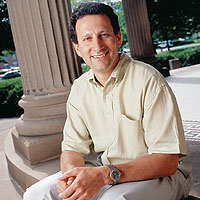
Long
known as a marketing powerhouse, the Kellogg School's best-kept
secret may be the strengths of its Finance Department
By
Matt Golosinski
"The hidden
jewel." That's how Kellogg School Dean
Dipak C. Jain refers to the school's Finance
Department, a department brimming with award-winning scholars
and teachers whose innovations have helped shape the direction
of their discipline.
Hidden?
Well, the department's eclectic strengths are no secret to
other finance scholars, or to the leading academic journals
who have published a wealth of Kellogg research in the area,
bestowing such honors as the Smith
Breeden Prize on seven Kellogg School professors. To
take only one example, Professor Robert
McDonald's Derivatives Markets textbook is required
reading at leading business schools around the world.
Students
too seem to know how to find the fourth floor of the Jacobs
Center, which is home to the Finance Department (as well as
the more prominent Marketing
Department).
| |
 |
| |
© Nathan Mandell
Michael Fishman, Finance Department chair, says Kellogg
offers "a broad range of expertise," including strengths
in entrepreneurial finance. |
| |
|
In fact,
the numbers at first are hard to believe: Some 55 percent
of all Kellogg School students major in finance, pursuing
either a more analytical focus in the subject, or else the
general corporate finance major designed for, say, marketers
who recognize the importance of a rigorous finance foundation.
Each year, financial services companies hire about 20 percent
of the Kellogg graduating class.
When more than
half the students at the world's premier marketing school
are tackling issues such as asset pricing, capital budgeting
and derivatives, it's safe to say that the Kellogg curriculum
offers expansive opportunities for academic excellence beyond
its deservedly famous Marketing Department.
Yet finance at
Kellogg remains hidden, since for many in the mainstream business
press the school is inextricably linked with its marketing
heritage.
Michael
Fishman and his finance colleagues wouldn't mind augmenting
that perception a bit, and sharing in more of the spotlight.
Fishman,
the Norman Strunk Distinguished Professor of Financial Institutions
and chair of the Finance Department, says finance at Kellogg
is an area of enormous and diverse strength, offering a range
of course options that most other schools find difficult to
match.
"There's
a lot of high-quality research and teaching going on in our
department," says Fishman, an expert in financial market regulation
and contracting. "Our faculty has a broad range of expertise
which we bring to both the MBA and Executive Education curriculum.
We're very strong on the technical side, but we're also strong
on the entrepreneurial side of the discipline. Where other
schools might only be able to offer one course in an area,
we frequently can offer multiple advanced electives, such
as with our derivatives courses."
Entrepreneurial
Finance is one of the department's most popular courses,
says Fishman, taught by one of the school's most popular professors,
Steve
Rogers. Entrepreneurship has been a hallmark of the Kellogg
School across all areas for years, so it's no surprise that
this topic also finds a place in finance.
"The entrepreneurial
finance course focuses on every financial aspect of entrepreneurship,
including how much money is needed to fund a venture, when
is it needed, whether it should be debt and/or equity, where
can it be raised and the cost of the capital," explains Rogers,
the Gordon and Llura Gund Family Professor of Entrepreneurship.
Additional topics that are covered in detail are valuation
and cash flow management.
"The goal of the
course is to teach the theoretical and practical financial
tools that should be used to increase the entrepreneur's chances
for success," adds Rogers.
| |
 |
| |
© Nathan Mandell
Professor Steve Rogers |
| |
|
Not
an Ivory Tower pursuit
At Kellogg,
says Fishman, students also benefit from the school's expertise
in valuation, risk management, fixed income and corporate
restructuring — issues that remain perennial challenges
for finance professionals.
"Valuation issues
are always part of the CFO's job," says Fishman, noting a
host of examples, such as technology investment or investment
in property and equipment.
As a current example
of a firm leveraging the risk management abilities of its
finance team, Fishman points to Southwest Airlines, which
has successfully hedged a large portion of its fuel costs.
In the curriculum, Kellogg professors discuss different strategies
that airlines could use to hedge these risks and the costs
and benefits of each.
"What do you hedge?
What don't you hedge? Risk management is a big issue and one
we do well at Kellogg," says Fishman.
The overall
scope of finance is enormous, with its influence extending
into any number of areas. To the layperson in the street,
finance may seem to deal exclusively with numbers and abstractions.
Not so, says Robert
Korajczyk, senior associate dean: curriculum and teaching,
and former Finance Department chair.
"Most of the concepts
in finance are very concrete and down to earth," explains
Korajczyk, the Harry G. Guthmann Distinguished Professor of
Finance, and an expert in asset pricing. "A lot of times you
encounter concepts that seem fairly obvious, but they weren't
so obvious until someone came along and pointed them out."
Kathleen
Hagerty concurs.
"Finance is all
about people's problems: deciding how much to save and how
to allocate their savings among assets and insure against
risk," says Hagerty, the First Chicago Distinguished Professor
of Finance and former department chair.
In Hagerty's
view, finance is not some Ivory Tower pursuit — even though
certain aspects of it, such as her own expertise in derivatives,
can indeed be highly technical. She sees her discipline as
being in the middle of much that is important in the contemporary
world.
Next
page: "As a finance scholar,
you're not just standing on the sidelines explaining what
other people do"
1 | 2
|



